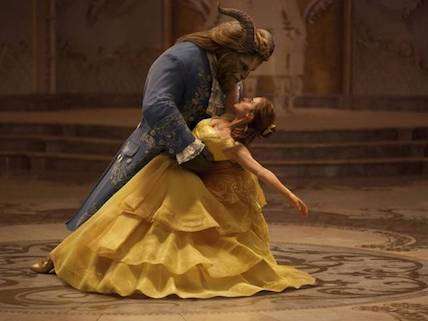Movie Review: Beauty and the Beast
Emma Watson helps bring another animated Disney classic to life.

Experiencing Disney's new live-action Beauty and the Beast is like being held down and force-fed candy for two hours. Candy fans can take this as a recommendation, and lovers of blazingly well-made fantasy films and full-belt Broadway musicals will surely have a good time. I had a good time myself, up to a point. But the movie is possibly overstuffed with Disney's warm artificiality—the cozily cluttered interiors, the bustling village square, the broody castle, the vivid weather—and at the end you may feel bloated.
Like the phenomenally successful live-action Cinderella of two years ago, Beauty is a remake of an earlier Disney animated fairy tale—the Oscar-winning 1991 film of sainted memory. As you may know, that picture was translated straight onto Broadway for a 13-year run, and continues traipsing the world to our very day. Now this.
It must be said that director Bill Condon (Dreamgirls, and the last two Twilights) is just the man to imbue this very expensive production with maximum wow. His cameras rarely stop swooping among the singing, twirling dancers (or rising above to salute the overhead artistry of Busby Berkeley, or rushing up a flower-blanketed hill to gather some Sound of Music echoes). The songs, by composer Alan Menken and lyricists Howard Ashman or, alternatively, Tim Rice, will mostly be familiar to Beauty fans (there are four unobjectionable new tunes), and they're mostly knocked out of the park by the gusto-fueled cast.
The story is pretty much the same, too (it's been minimally adjusted for purposes of feminism and gay inclusion). Emma Watson is Belle, a young French woman longing for a more exciting life than the one she's living with her clockmaker father (Kevin Kline) in their tiny village. A pompous army captain named Gaston (Luke Evans) has his eye on her, but as his chubby aide-de-camp LeFou (Josh Gad) gently suggests, there's no way that union is ever going to happen.
On a trip out of town, Belle's dad comes upon a gloomy castle in a dark forest—the home of a prince (Dan Stevens) who was long ago cursed by a malevolent crone, and is now living out his days as a huge, furry beast. He will remain trapped in this form until he finds true love, or learns what love is, or…I'm not sure, really—something about love. Anyway, Belle comes to her father's rescue, and soon takes up residence in the prince's castle, which is filled with enchanted household furnishings—a talking teapot named Mrs. Potts (voice of Emma Thompson) and her son, Chip (Nathan Mack); a singing wardrobe closet called Madame Garderobe (Audra McDonald); and a love-struck feather duster known as Plumette (Gugu Mbatha-Raw). The chattiest of these ancillary characters is the comic-relief duo of Lumière (Ewan McGregor), a helpful candelabrum, and Cogsworth (Ian McKellen), a grumpy mantel clock.
So that's the well-known setup. Can Belle free the beastly prince from his curse? (Spoiler: yes.) Do the actors really sing? (Yes—well, they lip-synch to their pre-recorded tracks.) Do the old showstoppers—like "Be Our Guest" and "Gaston"—still stop the show? (Very much so.) So what's the problem?
As much fun as all of this is, I think there are two problems, both of them in the casting, one of them relatively minor. The performers are generally aces (especially Josh Gad, a member of the original cast of The Book of Mormon, whose manner is so broadly effulgent I couldn't tell whether he was supposed to be openly gay or simply the soul of old Broadway). But Emma Watson seems to me to be too smart and contemporary for this sort of big-budget fantasia. (Recall her sharp work in The Perks of Being a Wallflower and This Is the End.) Was she attracted to this project by its slight feminist slant? (Belle is a big reader in an unspecified time in which women aren't supposed to be taught to read at all.) Surely it wasn't the money that drew her.
But Watson has an indomitable appeal. This is not the case with Dan Stevens, an actor of low-voltage charisma who may have had his most fitting role as the soft-mannered Matthew Crawley on Downton Abbey. His best work here is done by his elaborate Beast makeup—the furry face, the sweeping horns; even the flowing greatcoat helps hold our interest. At the end, when he's restored to his princely form—to the bland good looks of Dan Stevens, that is—it's hard not to hear in our ears the words of Greta Garbo after seeing the indelible 1946 French version of this story: "Give me back my beast," she (reportedly) said. The feeling of let-down—inevitably, perhaps—is here even more pronounced.


Show Comments (37)